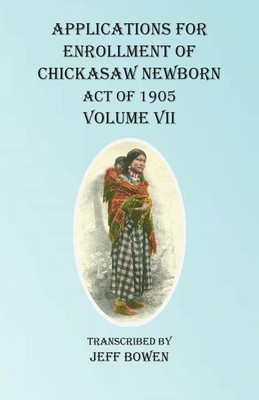
- We will send in 10–14 business days.
- Publisher: Native Study LLC
- ISBN-10: 1649680694
- ISBN-13: 9781649680693
- Format: 14 x 21.6 x 1.7 cm, softcover
- Language: English
- SAVE -10% with code: EXTRA
Applications For Enrollment of Chickasaw Newborn Act of 1905 Volume VII (e-book) (used book) | bookbook.eu
Reviews
Description
The Applications for Enrollment of Chickasaw Newborn, Act of 1905, are found in National Archive film M-1301, Rolls 455-458, under the heading of Applications for Enrollment of the Commission to the Five Civilized Tribes. These applications contain considerably more information than stated on the census cards found in series M-1186.The governing 1905 statute (H.R. 17474) defined Chickasaw Newborn as "infant children born prior to September twenty-fifth, nineteen hundred and two, and who were living on said date, to citizens by blood of the Choctaw. . . ." It also authorized the Department of the Interior to enroll and make allotments to such children based on applications received on their behalf no later than May 2, 1905. (At the time, the Interior Department estimated that the statute would cause about 1,500 Newborns to be added to the Chickasaw Rolls.)
Like their Choctaw counterparts, the Chickasaw allotments were among the most sought after properties in Indian Territory. There was supposed to be a 25-year restriction on the sale or lease of any Indian lands so as to ensure that the owners wouldn't be swindled; however, the presence of huge asphalt and coal deposits in both the Choctaw and Chickasaw Districts elicited pressure from private interests to purchase the lands. On April 26, 1906, President Roosevelt signed the Five Tribes Bill removing some of the restrictions from the sale of all inherited land but continuing to prohibit full-bloods from selling their land for 25 years.
Mr. Bowen's faithful transcriptions of the Chickasaw Newborn applications provide the names of the applicants and their relatives, as well as the identities of all others--doctors, lawyers, midwives, etc.-- named in the applications.
EXTRA 10 % discount with code: EXTRA
The promotion ends in 19d.19:23:49
The discount code is valid when purchasing from 10 €. Discounts do not stack.
- Publisher: Native Study LLC
- ISBN-10: 1649680694
- ISBN-13: 9781649680693
- Format: 14 x 21.6 x 1.7 cm, softcover
- Language: English English
The governing 1905 statute (H.R. 17474) defined Chickasaw Newborn as "infant children born prior to September twenty-fifth, nineteen hundred and two, and who were living on said date, to citizens by blood of the Choctaw. . . ." It also authorized the Department of the Interior to enroll and make allotments to such children based on applications received on their behalf no later than May 2, 1905. (At the time, the Interior Department estimated that the statute would cause about 1,500 Newborns to be added to the Chickasaw Rolls.)
Like their Choctaw counterparts, the Chickasaw allotments were among the most sought after properties in Indian Territory. There was supposed to be a 25-year restriction on the sale or lease of any Indian lands so as to ensure that the owners wouldn't be swindled; however, the presence of huge asphalt and coal deposits in both the Choctaw and Chickasaw Districts elicited pressure from private interests to purchase the lands. On April 26, 1906, President Roosevelt signed the Five Tribes Bill removing some of the restrictions from the sale of all inherited land but continuing to prohibit full-bloods from selling their land for 25 years.
Mr. Bowen's faithful transcriptions of the Chickasaw Newborn applications provide the names of the applicants and their relatives, as well as the identities of all others--doctors, lawyers, midwives, etc.-- named in the applications.


Reviews